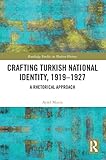Crafting Turkish National Identity, 1919-1927 : a rhetorical approach / Aysel Morin.
Material type: TextSeries: Routledge studies in modern historyPublication details: New York: Routledge, 2022.Edition: First Published 2022Description: 208 pages; 24 cmISBN:
TextSeries: Routledge studies in modern historyPublication details: New York: Routledge, 2022.Edition: First Published 2022Description: 208 pages; 24 cmISBN: - 9780367715014
- 956.1/023 23
- DR477 .M858 2022
| Item type | Current library | Collection | Call number | Copy number | Status | Notes | Barcode | |
|---|---|---|---|---|---|---|---|---|
 Books
Books
|
Rabdan Academy General Stacks | General Collection | DR477 .M858 2022 (Browse shelf(Opens below)) | C. 1 | Available | AED 442.00 | 21772 |
Browsing Rabdan Academy shelves,Shelving location: General Stacks,Collection: General Collection Close shelf browser (Hides shelf browser)

|

|

|

|

|

|

|
||
| DP103 .A312 2014 لغز الماء في الاندلس / | DP402 .B24 A141 2022 Barcelona / | DR435 .P696 2018 Insurgency and counter-insurgency in Turkey: the new PKK / | DR477 .M858 2022 Crafting Turkish National Identity, 1919-1927 : a rhetorical approach / | DR479 .U5 B49 2020 Turkish intelligence and the Cold War : the Turkish secret service, the US and the UK / | DR486 .B697 2014 سراي السلطان / | DR486 .B697 2014 سراي السلطان / |
Includes bibliographical references and index.
"Examining Mustafa Kemal Atatürk's Büyük Nutuk (The Great Public Address), this book identifies the five founding political myths of Turkey: the First Duty, the Internal Enemy, the Encirclement, the Ancestor, and Modernity. Offering a comprehensive rhetorical analysis of Nutuk in its entirety, the book reveals how Atatürk crafted these myths, traces their discursive roots back to the Orkhon Inscriptions, epic tales, and ancient stories of Turkish culture, and critiques their long-term effects on Turkish political culture. In so doing, it advances the argument that these myths have become permanent fixtures of Turkish political discourse since the establishment of Turkey and have been used by both supporters and detractors of Atatürk. Providing examples of how past and present leaders, including Recep Tayyip Erdoğan, a vocal critic of Atatürk, have deployed these myths in their discourses, the book offers an entirely new way to read and understand Turkish political culture and contributes to the heated debate on Kemalism by responding to the need to go back to the original sources - his own speeches and statements - to understand him. Contributing to emerging discourse-based approaches, this book is ideal for scholars and students of Turkish Studies, History, Nationalism Studies, Political Science, Rhetorical Studies, and International Studies"--
There are no comments on this title.
